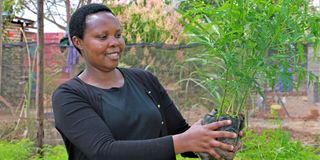Beautiful hardwood tree growing my money, one seedling at a time

Elida Mutie displays a Melia volkensii seedling at her nursery in Makueni County. The indigenous hardwood tree locally known as mukau is highly sought in the region.
What you need to know:
- Although Mukau is fast-growing, stakeholders are concerned that its population is rapidly dwindling due to over exploitation and diminishing forest covers.
- It is highly preferred in the arid and semi-arid regions because of its high-quality timber, which is not attacked by termites.
- The seeds are sown in raised seedbed filled with moist sterilised river sand, which is sprayed with fungicide to fight nematodes.
- The larger the pits, the better so that they trap more rain water. The tree thrives in most well-drained soils in dry lands.
Elida Mutie’s farm in Muusini village, on the border of Chyullu Hills National Park in Makueni County, hosts thousands of pigeon peas bushes, one of the crop that does well in the semi-arid region.
The crop has helped turn the fortunes of many farmers in the region, putting money in their pockets.
While nearly every homestead grows the peas, Elida’s farm stands out as she has diversified into tree seedlings, growing particularly those of Melia Volkensii, an indigenous tree known as Mukau.
She is tending to the seedlings when the Seeds of Gold team arrives on her farm.
"Initially, we wanted to grow fruit trees but we dropped the idea in fear of elephant attacks since we are close to the park,” she explains.
She then settled on growing Mukau. However, she was shocked to learn she could not easily access seedlings of the multi-purpose drought-resistant tree.
She seized the opportunity in 2018 to propagate Mukau seedlings, first to grow on her farmland. The lightbulb moment would later turn out to be a vibrant agribusiness venture.
Mukau is among the most valuable indigenous hardwoods. It is highly preferred in the arid and semi-arid regions because of its high-quality timber, which is not attacked by termites.
Although Mukau is fast-growing, stakeholders are concerned that its population is rapidly dwindling due to over exploitation and diminishing forest covers. The tree is hard to propagate.
Social media and word of mouth
Elida, 35, who holds a Bachelors in Agriculture Economics from Egerton University, runs a commercial Mukau nursery that holds at least 50,000 seedlings at any one point.
“We engage workers to collect ripe Mukau fruits from the wild, which we then de-pulp using a pestle and mortar to get the nuts. We then dry them for at least two days before they are cracked open using a blunt object to release the seeds,” Elida explains.
She uses the remains of the Mukau nuts as fuel. The seeds are sown in raised seedbed filled with moist sterilised river sand, which is sprayed with fungicide to fight nematodes.
The incubators are supposed to be covered in clear polythene paper. Transplanting the seedlings happens at three months old.
The seedlings are planted in 45 by 45 by 45cm pits which should be dug during the dry season.
The larger the pits, the better so that they trap more rain water. The tree thrives in most well-drained soils in dry lands.
Elida runs the seedlings venture jointly with James Mutie, her husband. They market the seedlings that go for Sh100 each mainly through social media and word of mouth.
Farmers in drylands should grow Mukau trees alongside cowpeas, green grams, and fodder grass.
As farmers wait for it to produce high quality timber in 10-18 years, Mukau trees act as wind breakers and its leaves are a rich fodder and source of manure," says Michael Otieno, the in-charge at Kenya Forestry Research Institute station in Kibwezi, Makueni.





